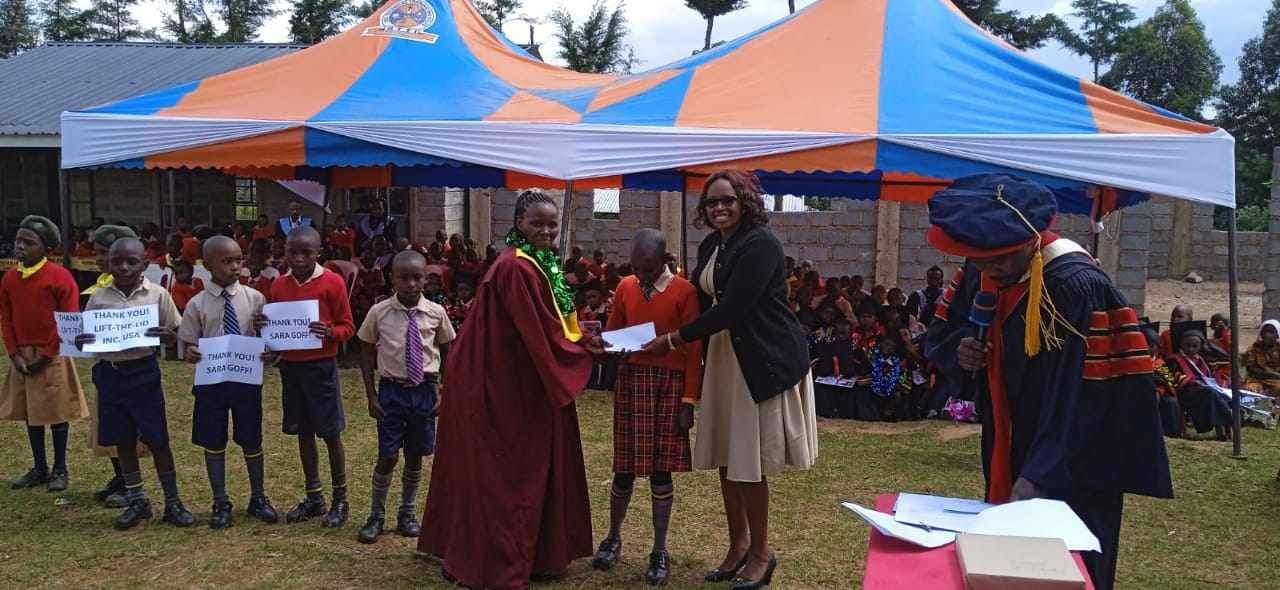
Lift the Lid hosts annual writing competitions at each of our schools to give our students the chance to be heard, improve their writing, and earn a scholarship. We look forward to reading their essays and learning more about their daily lives, memorable experiences, fears, hopes, and goals. When children know that their words are important, that they can achieve what they set their minds to, and make a difference in our complicated world, they understand why their education matters…and life takes on new meaning.
Thank you for taking the time to read Harriet’s essay and for all your support over the past 12 years that Lift the Lid has encouraged and, in many cases, made it possible for impoverished children to go to school.
You’ll find secure options for making a tax-deductible donation here, and we’ll send you a student’s essay. If you’re interested in starting a pen pal with one of our students, we’re happy to make that happen! Send Lift the Lid’s Founder, Sara Goff, an email at saragoff@saragoff.com.

October 19th, 2023
Dear Scholars of Keneni Academy,
Congratulations on completing Keneni Academy’s 2nd Annual Writing Competition! You submitted strong essays and talented drawings that will positively impact many people. We are proud to share your work with those who donate to Lift the Lid and Keneni Acedemy. Thank you for taking the time and putting your heart into your words and drawings!
I was especially impressed with the stories you told that communicated both hardships and good moral values. Even when you wrote about dangerous situations or moments of fear, you often found solutions or reasons to feel grateful. This shows your hope and enthusiasm for a better future!
Writing requires humility; it is a learning-process and often means asking tough questions of others and yourself. For example, was I honest? Did I write about how I really feel? Writing also takes tremendous bravery knowing people you may or may not know will read your words, a part of who you are. All of you balanced humility with bravery and composed your essays and illustrations with confidence.
As I always say, the best measure of your writing is how much you’ve learned about yourself and life, how much you’ve grown as a writer, and how much you’ve expanded the hearts and minds of others. Writing is exciting because you can always strive to say more and say it better. It is a never-ending opportunity to learn, to think more deeply, to share who you are, and to help others learn, think, and reflect, too. This is why writing is such a powerful tool!
*As you continue to write for positive change, remember these key components to a strong essay or story:
- a clear message with clear goals.
- a personal story or examples from your community that bring your message to life; -a learning-lesson, solution, a moment of hope, or reason to feel grateful.
**Reread your work and with each sentence, ask yourself these two questions:
- What words can I omit that slow down the pace or lessen the impact of that sentence?
- When I use words like “thing” and “everything,” that don’t give the reader a clear picture, how can I be specific?
For example, you could edit this sentence: “If peace will always prevail in the whole world, then other things with follow suit” to “If peace prevails in the world, equality and good works will follow.”
Below are my thoughts on your essays:
Blessing Chepkoech tells the story of a girl who drops out of school and becomes pregnant before she is ready to be a mother. Through her story, Blessing shows us the downward cycle of poverty that often befalls young girls when they become pregnant and forgo their education. The low-paying jobs available to them are not enough to support a family.
The young mother in Blessing’s story tries to marry her ten-year-old daughter to an older man. She must know how dangerous and devasting such a marriage would be, essentially destroying her daughter’s life, but she is desperate and lacks the education to make good moral decisions. The cycle of poverty will never end if daughters are forced to marry and give up their education. Kenya will suffer without healthy, confident, educated women. The daughter in Blessing’s story runs to the police and is saved. This powerful story ends hopeful as Blessing sees a change in Kenyan society with law enforcement protecting young girls’ rights.
Blessing, your message is critical, and your writing is very clear. Congratulations! You tell a story I’ll never forget!
Abigael Chepkemoi gives us vignettes or brief stories about life in her community and the dangers she sees that threatens her neighbors’ lives. Some hazards and hardships result from fetching water, living without electricity, or not having enough money for food and school fees. They happen to people who are sincerely trying to build a good life. She writes about other people who succumb to alcoholism, and she warns of this hopeless path. “When I was going to play in the field, a man was sleeping on the road. He had drunk a lot of alcohol.” In seeing the dangers in her community, she searches for a better way of life for all.
Abigael, you chose a creative way to share your concerns for the people in your community. By using vignettes, or snapshots of how people live and the troubles they face, you cover many issues and give us a full picture of the changes you’d like to see. Congratulations on being a scholar!!
Debra Cherono tells a fun short story about a cat, a hen, and a special razorblade that comes in very handy shaving the other animals on the farm. We are reminded to keep safe useful items and especially sharp ones. Debra also includes an important lesson to share what we have with others, as the cat shares the razorblade with the hen.
Debra, your drawings tell the story along with your words, and they show a lot of talent as they bring your story to life! Well done!!
Debra Chepchonba uses words and illustrations to share a part of her life that brings her happiness, relaxation, and pride. Her pet hen is yellow and has chicks to care for. It also makes many eggs. Debra shows how we love the things we care for, whether they are animals, a garden, flowers, or other people. When we give our heart to something it makes life meaningful!
Debra, thank you for such a beautiful message. Your drawing of your pet hen and its chicks is excellent…very precise and artistic!
Caleb Kiptoo tells an edge-of-your-seat story about a rainstorm and devastating flood in his village. He writes, “The rain rained heavily and the man who remained in the village was taken by the water. There was a big that was also taken by the water, and he tried to catch it, but the water blocked him. He tried again and caught the branch of the tree and climbed it.” In his story, Caleb shows how much the people care about one another and worry for each other’s safety. When they hear that not a single life was lost after the flood recedes, they rejoice together. “The village was happy because everyone was okay. The people celebrated because nobody died.”
Caleb, what an exciting and triumphant story! In telling others about this potentially tragic storm, you relay an important message: a village that cherishes life and one another is a strong and happy community. I wish the whole world could embrace your message right now!
Brian Kiprono Ngetich created a fabulous fairy tale with a moral about peace. We all have disagreements at times with strangers, friends, and even family members. If we overlook our differences for the sake of keeping peace, we can live a safe, happy, and healthy life. It’s true that sometimes we have to take a stand for what is right. Simba, the King of the Lions, had to take a stand to stop the other lions from fighting. He “roared loudly” and the others stopped. What an important message! The most effective and peaceful way to take a stand is to use your voice, and you can do that by speaking, writing, and even roaring.
Brian, thank you for your creative work. Your message is very important, and your illustrations are wonderful. You have a lot of talent!
Abigael Cherotich writes clearly and passionately about the joy and necessity of water to her family and community. “Our community is called Njerian. I love my community so much. My parents are waiting for the rain to use water… At my home we need water to drink or for washing clothes and utensils. At home we drink water to be hydrated.” She also tells us how important the rain is to their everyday life and survival, staying hydrated. We understand from her essay that water is essential to her community, and they depend on the rain.
Abigael, thank you for writing about this critical topic and sharing how much you love your home and school. I am proud of your essay and neat handwriting, too. Well done!!
Harriet Chepngetich tells the story of a 14-year-old girl named Mariamu who faces the possibility of being married to a grown man, a stranger. She knows early marriage is devastating to a young girl’s health and life. She knows an older man will not respect her as an equal who deserves a good education and the freedom to choose a career path. She knows her feelings will not be heard, and her goals will not be honored. We meet Mariamu as she is hiding under her bed. We fear that the man and his friends who have come to take her will succeed, that her grandmother will not be able to drive them away. Harriet writes, “All that time [hiding], her body was shaking like the strong wind. She prayed to God to rescue her.”
Harriet, this is a story we will never forget. It is an unimaginable reality for too many young girls, and you make that horror clear. In the end, Mariamu is rescued by the police, showing us the urgency for police intervention. Thank you for sharing such a brave story. Your writing is very descriptive, giving your words more power. I felt like I was with Mariamu, scared, hiding under the bed.
Victor K. writes about the hardships that resulted from COVID-19 and the downward spiral that families face when a parent or caregiver becomes seriously ill. He tells the story of a man who is sick with COVID and can no longer care for his wife and children and watch over his land. As more people in their community become ill and cannot work to earn a living, crime becomes more prevalent. The man’s land is stolen. His family does not have enough food and can no longer afford school fees. When school dropouts increase so does early marriage. Victor states, “His children were married early and also they were living in poverty,” showing us how far the disease goes to devastate a family and their community.
Victor, you write about a difficult topic, and you don’t shy away from the reality of this disease. I’m impressed with your work. When we understand what families are going through, we can react by helping out and showing them compassion. As you showed us through your story, the man is a hard worker and does nothing to deserve this fate. COVID-19 feels unfair.
Velma Chelangat writes with a clear and direct style, listing the trouble in her community that negatively impacts everyone: early marriage, alcoholism, crime, and a lack of water. She lives in fear of becoming a victim. With alcoholism comes violence, theft, and rape. If too many people are harming a community rather than contributing to its well-being, it no longer is a safe place to live. Positive change starts with being aware of the problems.
Velma, you are a good writer and I hope you continue to share your concerns and joys. By writing about the problems, you can increase awareness and inspire change. Congratulations on your essay!
Lilkana Kiptoo tells us about a time when she was bitten by a poisonous frog and had to be rushed to the hospital by her father. This memorable story shows us the dangers Lilkana faces when collecting water. “My mother told me to fetch water. The water was very dirty.” It also shows us an average day in her life. When she returns from the hospital, her sister is sweeping their compound and her mother is wiping the windows, like any other day.
Likana, your essay is a great example of how to grab people’s attention to ensure your message is heard. I could picture a young girl falling into a dirty river, frogs jumping on her, and her mother coming to her rescue. You then describe the race to the hospital and receiving medicine just in time before the doctor left. You are a very good storyteller! Thank God you are safe and in good health after that experience. I hope you keep writing!
Caleb Kipngeno describes the debilitating effects of poverty and how difficult it is to improve yourself when you don’t have a reliable source of food and water, healthcare, an education, and employment. “There is a big problem in our community of Kecheiyat. There is no water, so people have to go to the river, but it is too far away.” He gives the example of a poor family that fetches water and firewood in fear of encountering hyenas. The wife is bitten, and they can’t get her to a hospital. They run out of money and can’t send their son to school. They marry him early, which is against the law, and he is put in jail. We see how poverty leads to desperate choices that only make it harder to get on a better path.
Caleb, I can see that you gave your essay a lot of thought. Deep thinking and putting your thoughts into words is how people work for change and find solutions. I’m proud of the topic you chose and the honest way you shared your concerns. Congratulations! One day you might be the one to build a safer and more prosperous community.
To all of our Scholars, please know that if you keep writing, one day your words will create the future you want for yourself, your family, and community. Be brave, honest, and determined and your words will help you to fulfill your dreams. I believe you’re all winners, and I look forward to reading more of your writing!
God bless,
Sara Goff
Lift the Lid




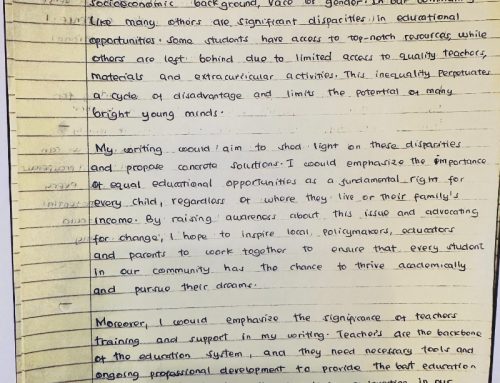
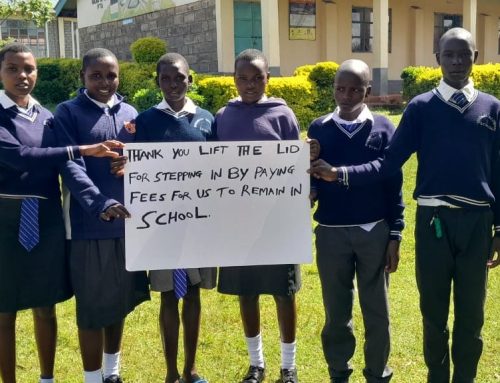
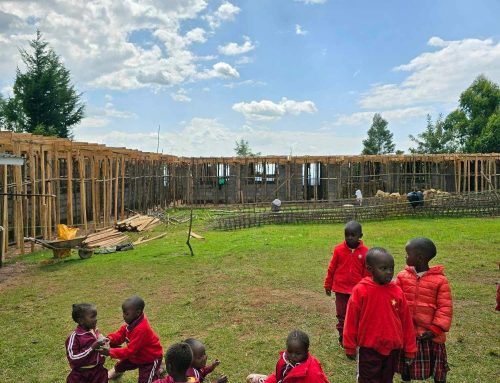
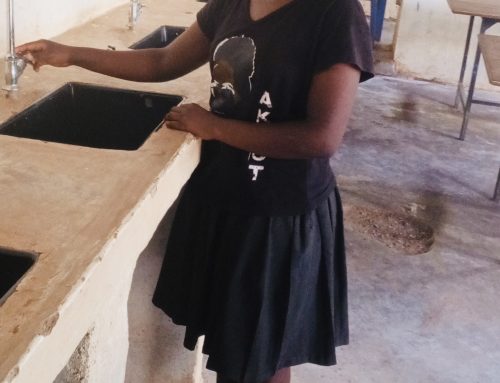
Leave A Comment